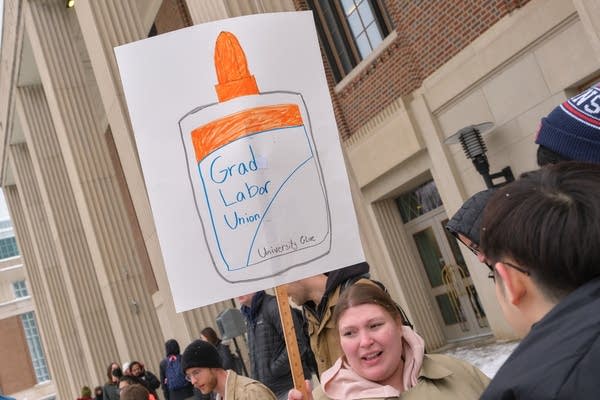With upcoming vote, U of M joins national wave of higher-ed unionization efforts

Go Deeper.
Create an account or log in to save stories.
Like this?
Thanks for liking this story! We have added it to a list of your favorite stories.
Graduate students at the University of Minnesota are now joining the wave of unionization efforts sweeping across the country in higher education.
After collecting around 2,800 union cards since their campaign launch in February, The Graduate Labor Union–United Electrical is now planning an election to determine whether graduate student workers at the U of M will form a union. If successful, they would join graduate students who have recently unionized at other universities including Temple University and the University of Chicago.
Unionizing at the University of Minnesota could bring fairer wages and increased benefits to workers, according to Matt Kornberg, a graduate student worker in the political science department and one of the nearly 200 U of M students leading the unionization effort.
These students often work as instructors and teaching and research assistants while working towards their graduate degrees.
Turn Up Your Support
MPR News helps you turn down the noise and build shared understanding. Turn up your support for this public resource and keep trusted journalism accessible to all.
“We want better working conditions, we want better pay,” Kornberg said. “We want better and more comprehensive health care, especially for dependents and family benefits. We want robust anti-discrimination procedures and job security. And we understand that the best way to do this is through collective bargaining and the power of the union.”
Lawyer: Higher ed is seeing union ‘momentum’
Jim Thelen is a former labor lawyer and has previously served as general counsel for higher education institutions, most recently at the University of Maine system. He said this new wave of union activity in higher education is expected to continue.
Thelen said the years since the beginning of the COVID-19 pandemic, which have seen increased inflation and economic pressures as well as a change in presidential administration, have created a snowball effect of union activity.
“Success in labor activism begets more success,” Thelen said. “So as one union election is successful, and then another and then another and then there are strikes, all of that feeds the momentum that we're seeing for these types of actions.”
At Temple University, graduate student workers went on strike for over a month this spring while in contract negotiations with administration. They ultimately agreed on a contract that included thousands of dollars in raises for graduate students. Workers will also receive increased parental leave time as part of the new contract, according to Inside Higher Ed.
In Minnesota, graduate students are specifically pushing for their wages and benefits to stay in line with the cost of living. These goals are relatively consistent among other unionization efforts across the country, Thelen said.
A press release said graduate student workers at the university receive around $23,000 a year for their work researching and teaching. In Hennepin County, the current cost of living for a single person with no children is estimated to be around $37,000 a year.
“Simply put, we cannot do the best work that we would like to be doing, as researchers, as teachers, at the university if we were not paid enough to live stably,” said Anya Auerbach, a union rep and doctoral candidate in ecology, evolution and behavior.

Unionization efforts have failed at U of M in the past
This is not the first time graduate students at the university have tried to unionize. In 2012, graduate students voted against unionization in an election. Graduate students also rejected unionization efforts in 1974, 1990, 1999 and 2005.
Auerbach said organizers believe this current effort could end in a different result. Organizers increased their outreach to students in all majors and departments during the initial drive, especially those in STEM fields.
“Looking at other recent grad student unionization efforts have really shown us the power of organizing STEM workers, and that STEM workers are just as on board with unionization as what you might more traditionally think of as pro-union workers in the humanities fields,” Auerbach said.
The same union working with graduate students at the University of Minnesota, United Electrical, Radio and Machine Workers of America, has also had success with organizing students at Northwestern University and Johns Hopkins University.
This will likely create additional momentum for the union drive in Minnesota, Thelen said.
“I would absolutely expect those union organizers to be saying, ‘We were successful there, we can be successful here,’ and that itself will create momentum in favor of graduate students,” Thelen said.
Although each union drive will have different results and will get different responses from universities, Thelen said some recent union election results in higher education have been “lopsided,” with 90 percent of graduate student workers voting to unionize in some places.
U of M working with Bureau of Mediation Services
U of M did not respond to an MPR News request for comment, but in a March 21 systemwide email, University of Minnesota Provost Rachel Croson said they will be working with the Bureau of Mediation Services to determine the details of the election.
“It is important that all of our graduate assistants make informed and independent decisions about whether being represented by a union is the right choice for them,” Croson said in the email. “This vote will be important for their future, and for the future of graduate education at the University of Minnesota.”
Thelen noted that while there have been some significant union victories in higher education, there is no guarantee unions will ultimately achieve every one of their goals.
“For students who may unionize, it gives them the opportunity to negotiate and work collectively, but negotiations are never a guarantee and that's the tricky part,” he said.


